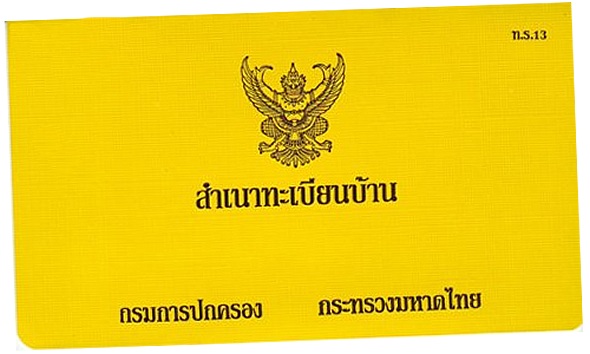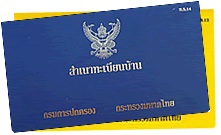Tabien baan
Yellow or blue Thai house book

What is a tabien baan or Thai house book?
Tabien baan or Thai house book is the official local government issued house or apartment address and resident registration booklet. It is an administrative document issued by the local municipality (amphur). The persons having their domicile or legal residence at the house or condo unit are registered in the house book.
Contrary to what is often assumed by foreigners this document has nothing to do with ownership of a house or condo and cannot be used as proof of ownership. It is a booklet issued by the local municipality (not the land department) that belongs to the official address registration papers of a home or condo and its practical use is that it registers and proves a persons place of legal residence (official domicile). A house book could state the name of the owner but in the case of a foreign non-resident owner not (unless he has official residency in Thailand).
Thailand has 2 types of house books (with a blue or yellow cover):
- - the blue tabien baan or blue house book (Thor.Ror.14) for Thai nationals, and;
- - the yellow tabien baan or yellow house book (Thor.Ror.13) for foreigners.
As a house book proves a person's domicile it is asked in official registration procedures such as the transfer of ownership of a car or real estate, opening a bank account or when applying for a new electricity or telephone line connection and gives for example Thais the right to vote in a district. As foreigners are usually not registered in a Thai house book foreigners with a non-immigrant visa can where proof of address is required alternatively show a letter of residence issued by the local immigration office, or when he is the owner a condominium unit title deed in combination with the (empty) blue tabien baan and his passport.
In case of a foreigner owns a house (separate from the land) or condominium the blue house book is usually empty, unless he has Thai nationals living with him who have their permanent home at this address.
House book application
A house book can be issued for a house, condominium apartment (whether registered under the Condominium Act or not). The official house book for Thais is the blue book and for foreigners residents a yellow book. A blue book is standard issued but in case of a foreigner it can be exchanged for a yellow book if the foreigner meets specific criteria. The documents required for the exchange of a blue book of a completed house or condominium for a yellow book could, besides the application form, could include :
(the list below is a sample list of documents that could be required in the application of a yellow book, but note that each amphur district office has their own requirements therefore always check with them first what documents they require)
- a non-immigrant visa
- copy passport with (official) translation
- work permit
- marriage certificate
- apartment unit title deed (condo unit)
- documents relating to the land and right to use and possess the land (consent land owner)
- the official land office sale of a structure document
- building permit.
The blue or yellow tabien baan is not an important document for foreigners and most foreigners owning a condominium or a house (separate from the land) will have a (empty) blue house registration book and not a yellow book. The legal value for foreigners is very limited and generally there is no need or requirement to exchange a blue tabien baan for a yellow tabien baan. A yellow book does not confer any additional rights. However, foreigners married to a Thai national living in Thailand should have their name in the house book of the marital home. For Thais a house book's primary function is that it states his or her place of legal residence (permanent home).
Read more:
- ownership of a house in thailand
- yellow tabien baan (external thaivisa post)
Readers also liked
- Family law in Thailand
- Condominium laws (foreign ownership)
